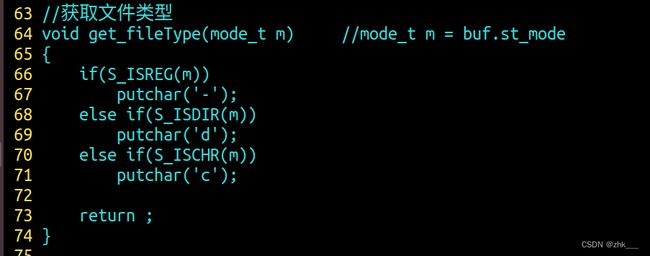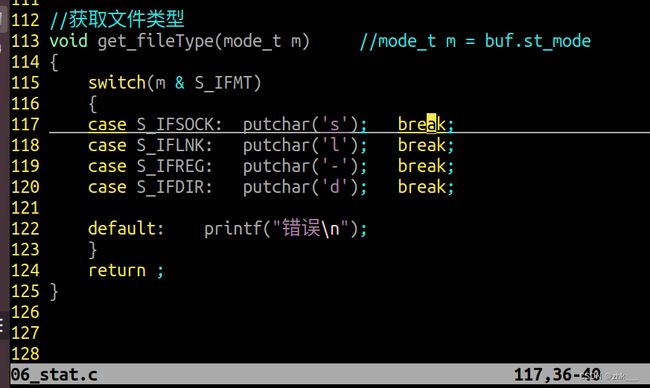嵌入式养成计划-25-IO进线程----IO,时间相关函数,文件IO函数,文件属性相关函数,目录相关函数
接上文:上文:标准IO函数
一个小demo:Linux下使用C语言实现Linux的查看文件信息命令“ls -l”
Linux下使用C语言实现Linux的查看文件信息命令“ls -l”
六十、 IO
60.4 时间相关的函数
60.4.1 time
功能:
获取1970-1-1至今的秒数;
原型:
#include 60.4.2 localtime
功能:
将1970-1-1至今的秒数,转换成日历格式;
原型:
#include struct tm 结构体
struct tm {
int tm_sec; /* Seconds (0-60) */ 秒
int tm_min; /* Minutes (0-59) */ 分
int tm_hour; /* Hours (0-23) */ 时
int tm_mday; /* Day of the month (1-31) */ 日
int tm_mon; /* Month (0-11) */ 月=tm_mon+1
int tm_year; /* Year - 1900 */ 年=tm_year+1900
int tm_wday; /* Day of the week (0-6, Sunday = 0) */ 星期
int tm_yday; /* Day in the year (0-365, 1 Jan = 0) */ 一年中的第几天
int tm_isdst; /* Daylight saving time */
};
60.4.3 自己写的时钟
#include 60.5 文件IO函数
- 文件IO函数是由操作系统提供的基本IO函数,与操作系统绑定,不同操作系统之间文件IO函数不同,又称之为系统调用函数。
- 文件IO函数没有缓冲区!!
- 文件IO函数通过 文件描述符 来维护(操作)一个文件。
60.5.1 文件描述符
1. 文件描述符概念
- 文件描述符是一个整型数,其实是一个编号。每当打开一个文件的时候,操作系统会自动给这个文件编号,用这个编号来描述这个文件。
- 标准IO函数最终依然会调用对应操作系统提供的文件IO函数。标准IO函数是对文件IO函数的二次封装,在文件IO函数的基础上封装了一个缓冲区,同时将文件描述符也一起封装到了FILE结构体中。
简化的FILE结构体
struct _IO_FILE {
char* _IO_buf_base; /* Start of reserve area. */ 缓冲区的起始地址
char* _IO_buf_end; /* End of reserve area. */ 缓冲区的结束地址
int _fileno; 文件描述符:文件IO时候讲解。
}
- 文件描述符的总量是1024个,范围是[0, 1023]。所以在不使用的情况下,需要关闭。
- 申请原则:每次申请都从小到大依次遍历。若小的文件描述符被占用,则继续遍历,直到遍历到没有被使用过的文件描述符,若前面有文件描述符被释放,也会从小到大开始检索使用
2. 文件描述符的本质
3. 特殊文件描述符
| 特殊流指针 | 特殊文件描述符 | |
|---|---|---|
| FILE* stdin | stdin->_fileno | 0 |
| FILE* stdout | stdout->_fileno | 1 |
| FILE* stderr | stderr->_fileno | 2 |
4. 文件描述符总量计算
- 循环打开文件不关闭
#includeint main(int argc, const char *argv[]) { printf("%d %d %d\n", stdin->_fileno, stdout->_fileno, stderr->_fileno); while(1) { FILE* fp = fopen("1.txt", "w"); if(NULL == fp) { perror("fopen"); return -1; } printf("%d\n", fp->_fileno); } return 0; } - getdtablesize()函数
功能: 获取当前程序能打开的最大文件描述符个数; 原型: #includeint getdtablesize(void); 使用: printf("size=%d\n", getdtablesize());
60.5.2 文件IO函数
open / close
write / read
lseek
1. open
功能:
打开一个文件;
原型:
#include 标准IO中的打开方式,分别对应上述文件IO中,flags的组合。
"r" : O_RDONLY
"r+" : O_RDWR // 不是追加
"w" : O_WRONLY|O_TRUNC|O_CREAT
"w+" : O_RDWR|O_TRUNC|O_CREAT
"a" : O_WRONLY|O_APPEND|O_CREAT
"a+" : O_RDWR|O_APPEND|O_CREAT
2. umask
the mode of the cre‐ated file is (mode & ~umask).
文件创建时候的权限是,mode & ~umask
具体运算情况:
mode & ~umask
mode : 0777 ----> 111 111 111
& 111 111 101 == ~umask ===> umask= 000 000 010 = 0002
:0775 ----> 111 111 101
- umask : 文件权限掩码,影响文件创建时候的权限。
- 例如将umask的值设置为0002,则可以确保其他用户肯定没有写权限。
- 获取uamsk的值: 终端输入umask
- 修改umask的值
- 终端输入: umask 0 — 将umask清0 — 只在设置终端有效
- 用umask函数设置umask的值
示例:#include#include mode_t umask(mode_t mask); umask(0); umask(0002);
3. close
功能:
关闭文件,释放文件描述符;
原型:
#include 4. write
功能:
将数据写入到指定文件中;
原型:
#include 5. read
功能:
从指定文件中读取数据; 遇到空格,\n字符不会停止读取
原型:
#include 6. lseek
功能:
修改文件偏移量,并获取修改后的位置距离开头的偏移量;
原型:
#include 60.6 文件属性相关函数
60.6.1 stat
功能:
获取文件属性;
原型:
#include 结构体 struct stat
struct stat {
dev_t st_dev; /* ID of device containing file */
ino_t st_ino; /* Inode number */ //文件的inode号
mode_t st_mode; /* File type and mode */ //文件类型及权限
nlink_t st_nlink; /* Number of hard links */ //文件的硬链接数
uid_t st_uid; /* User ID of owner */ //文件所属用户的uid号
gid_t st_gid; /* Group ID of owner */ //文件所属用户的gid号
dev_t st_rdev; /* Device ID (if special file) */
off_t st_size; /* Total size, in bytes */ //文件的大小
blksize_t st_blksize; /* Block size for filesystem I/O */
blkcnt_t st_blocks; /* Number of 512B blocks allocated */
/* Since Linux 2.6, the kernel supports nanosecond
precision for the following timestamp fields.
For the details before Linux 2.6, see NOTES. */
struct timespec st_atim; /* Time of last access */ //最后一次访问的时间
struct timespec st_mtim; /* Time of last modification */ //最后一次修改的时间
struct timespec st_ctim; /* Time of last status change */ //最后一次改变状态的时间
#define st_atime st_atim.tv_sec /* Backward compatibility */ 将上述时间结构体变量中,秒的成员单独宏定义
#define st_mtime st_mtim.tv_sec
#define st_ctime st_ctim.tv_sec
};
60.6.2 提取文件权限
mode: 0100664
mode_t st_mode; 该成员变量中存储了文件的类型以及权限。
mode_t类型本质上是一个:unsigned int
。st_mode变量的低9bits,存储了文件的权限。范围[8, 0]bit
664 ---> rw- rw- r--
0664 ---> 110 110 100
& 100 000 000
--------------
100 000 000 ===> 结果不等于0,打印'r'
0664 ---> 110 110 100
& 010 000 000
--------------
010 000 000 ===> 结果不等于0,打印'w'
0664 ---> 110 110 100
& 001 000 000
--------------
000 000 000 ===> 结果等于0,打印'-'
60.6.3 提取文件类型
mode: 0100664
mode_t st_mode; 该成员变量中存储了文件的类型以及权限。
mode_t类型本质上是一个:unsigned int
- 通过宏函数提取;
步骤: man 2 stat ---->st_mode的解释意思:see inode(7) man 7 inode S_ISREG(m) is it a regular file? '-' S_ISDIR(m) directory? 'd' S_ISCHR(m) character device? 'c' S_ISBLK(m) block device? 'b' S_ISFIFO(m) FIFO (named pipe)? 'p' S_ISLNK(m) symbolic link? (Not in POSIX.1-1996.) 'l' S_ISSOCK(m) socket? (Not in POSIX.1-1996.) 's' 上述,若为该文件,则返回真。否则返回假。
- 从st_mode中提取代表文件权限的bits
S_IFMT 0170000 bit mask for the file type bit field
mode & s_IFMT
mode: 0100664 ----> 001 000 000 110 110 100
S_IFMT: 0170000 ----> 001 111 000 000 000 000
--------------------------------------------------------
001 000 000 000 000 000 ===> 0100000
计算后的结果,与下列宏进行比较,等于哪个就是哪个类型文件;
S_IFSOCK 0140000 socket
S_IFLNK 0120000 symbolic link
S_IFREG 0100000 regular file
S_IFBLK 0060000 block device
S_IFDIR 0040000 directory
S_IFCHR 0020000 character device
S_IFIFO 0010000 FIFO
mode & s_IFMT
mode: 040775 ----> 000 100 000 111 111 101
S_IFMT: 0170000 ----> 001 111 000 000 000 000
--------------------------------------------------------
000 100 000 000 000 000 ===> 040000
60.6.4 提取文件所属用户名
uid_t st_uid; /* User ID of owner */ //文件所属用户的uid号
getpwuid函数
功能:根据提供的uid,转换成用户信息;
原型:
#include struct passwd {
char *pw_name; /* username */ 用户名
char *pw_passwd; /* user password */ 用户密码
uid_t pw_uid; /* user ID */ uid
gid_t pw_gid; /* group ID */ gid
char *pw_gecos; /* user information */
char *pw_dir; /* home directory */
char *pw_shell; /* shell program */
};
struct passwd* pwd = getpwuid(buf.st_uid);
if(NULL == pwd)
{
perror("getpwuid");
return -1;
}
printf("usrname: %s\n", pwd->pw_name);
60.6.5 提取文件所属组用户名
gid_t st_gid; /* Group ID of owner */ //文件所属用户的gid号
getgrgid函数
功能:通过gid获取对应组的信息;
原型:
#include struct group {
char *gr_name; /* group name */ 组名
char *gr_passwd; /* group password */
gid_t gr_gid; /* group ID */
char **gr_mem; /* NULL-terminated array of pointers
to names of group members */
};
struct group* grp = getgrgid(buf.st_gid);
if(NULL == grp)
{
perror("getgrgid");
return -1;
}
printf("grpname: %s\n", grp->gr_name);
60.7. 目录相关函数
60.7.1 opendir
功能:打开一个目录
原型:
#include 60.7.2 closedir
功能:关闭目录;
原型:
#include 60.7.3 readdir
功能:读取目录;
原型:
#include struct dirent {
ino_t d_ino; /* Inode number */
off_t d_off; /* Not an offset; see below */
unsigned short d_reclen; /* Length of this record */
unsigned char d_type; /* Type of file; not supported
by all filesystem types */
char d_name[256]; /* Null-terminated filename */
};




